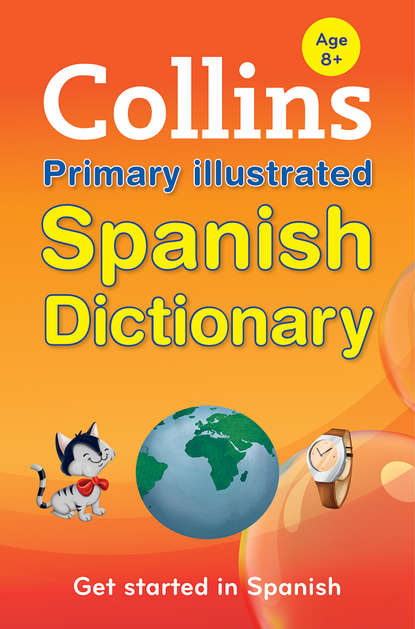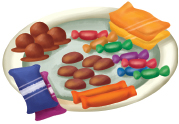
Полная версия:
Collins Primary Dictionaries
■ dormirse to fall asleep Me dormí en el tren. I fell asleep on the train. Se me ha dormido el brazo. My arm has gone to sleep.
el dormitorio NOUN
bedroom

dos (FEM dos) ADJECTIVE, PRONOUN
1 two Tenemos dos gatos. We have two cats.
2 both Al final vinieron los dos. In the end they both came. Los hemos invitado a los dos. We’ve invited both of them.
Tiene dos años. He’s two. Son las dos. It’s two o’clock. el dos de enero the second of January Nació el dos de enero. He was born on the second of January.
doscientos (FEM doscientas) ADJECTIVE, PRONOUN
two hundred doscientos cincuenta two hundred and fifty
doy VERB ▷see dar Si quieres, te doy uno. If you want, I’ll give you one.
el drogadicto la drogadicta NOUN
drug addict
la ducha NOUN
shower
darse una ducha to have a shower
ducharse VERB
to have a shower
la duda NOUN
doubt Tengo mis dudas. I have my doubts. Tengo una duda. I have a query. ¿Alguna duda? Any questions?
dudar VERB
to doubt Lo dudo. I doubt it. Dudo que sea cierto. I doubt if it’s true. Dudó si comprarlo o no. He wasn’t sure whether to buy it or not.
el dueño la dueña NOUN
owner
duermo VERB ▷see dormir Duermo ocho horas todos los días. I sleep eight hours every day.
dulce
dulce can be an adjective or a noun.
A (FEM dulce) ADJECTIVE
sweet
B MASC NOUN
sweet
durante ADVERB
during Tuvo que trabajar durante las vacaciones. He had to work during the holidays. durante toda la noche all night long Habló durante una hora. He spoke for an hour.
durar VERB
to last La película dura dos horas. The film lasts two hours.
durmiendo VERB ▷see dormir Me estoy durmiendo. I’m falling asleep.
duro
duro can be an adjective or an adverb.
A (FEM dura) ADJECTIVE
1 hard Los diamantes son muy duros. Diamonds are very hard.
2 tough Esta carne está dura. This meat’s tough.
B ADVERB
hard trabajar duro to work hard
E e
e CONJUNCTION
Language tip
e is used instead of y in front of words beginning with ‘i’ and ‘hi’, but not ‘hie’.
and Pablo e Inés. Pablo and Inés.
echar VERB
1 to throw Échame las llaves. Throw me the keys.
2 to throw out Me echó de su casa. He threw me out of the house.
3 to expel Lo han echado del colegio. He’s been expelled from school. Echo de menos a mi familia. I miss my family.
ecológico (FEM ecológica) ADJECTIVE
ecological un desastre ecológico an ecological disaster un producto ecológico an environmentally friendly product
ecologista ecologista
ecologista can be an adjective or a noun.
A ADJECTIVE
environmental un grupo ecologista an environmental group
B MASC/FEM NOUN
environmentalist
la edad NOUN
age Tenemos la misma edad. We’re the same age.
¿Qué edad tiene? How old is he?
el edificio NOUN
building
la educación NOUN
1 education educación física PE
2 upbringing Rosa recibió una educación muy estricta. Rosa had a very strict upbringing. Señalar es de mala educación. It’s rude to point. Es una falta de educación hablar con la boca llena. It’s bad manners to speak with your mouth full.
educado (FEM educada) ADJECTIVE
polite Es un chico bien educado. He’s a polite boy.
egoísta (FEM egoista) ADJECTIVE
selfish
el ejemplo NOUN
example ¿Puedes ponerme un ejemplo? Can you give me an example?
por ejemplo for example
el ejercicio NOUN
exercise La maestra nos puso varios ejercicios. The teacher gave us several exercises to do.
hacer ejercicio to do exercise
el (FEM SING la, MASC PL los, FEM PL las) ARTICLE
the Perdí el autobús. I missed the bus. Yo fui el que lo encontró. I was the one who found it. Ayer me lavé la cabeza. I washed my hair yesterday. Me puse el abrigo. I put my coat on. Tiene unos zapatos bonitos, pero prefiero los míos. Her shoes are nice but I prefer mine. No me gusta el pescado. I don’t like fish.
él PRONOUN
1 he Me lo dijo él. He told me.
2 him Se lo di a él. I gave it to him. Su mujer es más alta que él. His wife is taller than him. él mismo himself No lo sabe ni él mismo. He doesn’t even know himself. de él his El coche es de él. The car’s his.
la electricidad NOUN
electricity
eléctrico (FEM eléctrica) ADJECTIVE
electric una guitarra eléctrica an electric guitar
el elefante NOUN
elephant

elegir VERB
to choose No sabía qué color elegir. I didn’t know what colour to choose.
elijo VERB ▷see elegir Yo eligo el blanco. I choose the white one.
ella PRONOUN
1 she Ella no estaba en casa. She was not at home.
2 her El regalo es para ella. The present’s for her. Él estaba más nervioso que ella. He was more nervous than her. ella misma herself Me lo dijo ella misma. She told me herself. de ella hers Este abrigo es de ella. This coat’s hers.
e-mail NOUN
1 email
2 email address
embarazada ADJECTIVE
pregnant Estaba embarazada de cuatro meses. She was four months pregnant.
Language tip
Be careful! embarazada does not mean the same as embarrassed.
embarazoso (FEM embarazosa) ADJECTIVE
embarrassing
la emergencia NOUN
emergency la salida de emergencia the emergency exit
emocionante (FEM emocionante) ADJECTIVE
exciting El partido fue muy emocionante. The match was very exciting.
el empaste NOUN
filling
empatar VERB
to draw Empatamos a uno. We drew one-all.
el empate NOUN
draw un empate a cero a goalless draw
empezar VERB
to start Las vacaciones empiezan el día uno. The holidays start on the first. Ha empezado a nevar. It’s started snowing. volver a empezar to start again
el empleo NOUN
job Ha encontrado empleo en un restaurante. He has found a job in a restaurant. estar sin empleo to be unemployed
empollar VERB
to swot Me pasé la noche empollando. I spent the whole night swotting.
el empollón la empollona (MASC PL los empollones) NOUN
swot
la empresa NOUN
firm Mi padre trabaja en una empresa de informática. My dad works for a computer firm.

empujar VERB
to push Empuja la puerta. Push the door.
en PREPOSITION
1 in en el armario in the wardrobe Viven en Granada. They live in Granada. Nació en invierno. He was born in winter. Lo hice en dos días. I did it in two days. Está en el hospital. She’s in hospital.
2 into Entré en la cocina. I went into the kitchen.
3 on Las llaves están en la mesa. The keys are on the table. La librería está en la calle Pelayo. The bookshop is on Pelayo street. La oficina está en el quinto piso. The office is on the fifth floor.
4 at Yo estaba en casa. I was at home. Te veo en el cine. See you at the cinema.
5 by Vinimos en avión. We came by plane.

enamorado (FEM enamorada) ADJECTIVE
estar enamorado de alguien to be in love with somebody

enamorarse VERB
to fall in love Se ha enamorado de Yolanda. He’s fallen in love with Yolanda.
encantado (FEM encantada) ADJECTIVE
Está encantada con su abrigo nuevo. She loves her new coat.
¡Encantado de conocerle! Pleased to meet you!
encantar VERB
to love Me encantan los animales. I love animals. Les encanta esquiar. They love skiing.
encargar VERB
to order Encargamos dos pizzas. We ordered two pizzas.
encender VERB
1 to light
2 to switch on
encendido (FEM encendida) ADJECTIVE
on La tele estaba encendida. The telly was on.
el enchufado la enchufada NOUN
Amelia es la enchufada del profesor. Amelia’s the teacher’s pet.
enchufar VERB
to plug in Enchufa la tele. Plug the TV in.
el enchufe NOUN
1 plug
2 socket
enciendo VERB ▷see encender ¿Cómo enciendo la calefacción? How do I switch the heating on?
encima ADVERB
on Pon la taza aquí encima. Put the cup on here. encima de on/on top of
Language tip
encima de has two meanings. Look at the examples.
Ponlo encima de la mesa. Put it on the table. Mi maleta está encima del armario. My case is on top of the wardrobe.
encontrar VERB
to find No encuentro las llaves. I can’t find the keys.
encontrarse VERB
1 to feel Ahora se encuentra mejor. Now she’s feeling better.
2 to meet Nos encontramos en el cine. We met at the cinema. Me encontré con Manolo en la calle. I bumped into Manolo in the street.
el enemigo (FEM la enemiga) ADJECTIVE, NOUN
enemy
la energía NOUN
energy
enero MASC NOUN
January
Language tip
Months are not written with a capital letter in Spanish.
en enero in January Nació el seis de enero. He was born on the sixth of January.
enfadado (FEM enfadada) ADJECTIVE
angry

Mi padre estaba muy enfadado conmigo. My father was very angry with me.
enfadarse VERB
to be angry Papá se va a enfadar mucho contigo. Dad will be very angry with you.
la enfermedad NOUN
illness Adelgazó mucho durante su enfermedad. He lost a lot of weight during his illness.
el enfermero la enfermera NOUN
nurse Mi madre es enfermera. My mother’s a nurse.
enfermo enferma
enfermo can be an adjective or a noun.
A ADJECTIVE
ill He estado enferma toda la semana. I’ve been ill all week.
B MASC/FEM NOUN
patient un enfermo del Dr. Rojas one of Dr Rojas’ patients Los enfermos deben tomar precauciones especiales. Sick people need to take special precautions.
enfrente ADVERB
opposite Luisa estaba sentada enfrente. Luisa was sitting opposite. La panadería está enfrente. The baker’s is across the street. de enfrente opposite la casa de enfrente the house opposite
enfriarse VERB
1 to get cold La sopa se ha enfriado. The soup has got cold.
2 to cool down Deja que la sopa se enfríe un poco. Let the soup cool down a bit.
3 to catch cold Ponte el abrigo que te vas a enfriar. Put your coat on or you’ll catch cold.
engordar VERB
1 to put on weight No quiero engordar. I don’t want to put on weight. He engordado dos kilos. I’ve put on two kilos.
2 to be fattening Los caramelos engordan mucho. Sweets are very fattening

la enhorabuena NOUN
¡Enhorabuena! Congratulations!
enorme (FEM enorme) ADJECTIVE
enormous Tienen una casa enorme. They have an enormous house.
la ensalada NOUN
salad
enseguida ADVERB
straight away La ambulancia llegó enseguida. The ambulance arrived straight away.
la enseñanza NOUN
1 teaching
2 education la enseñanza primaria primary education
enseñar VERB
1 to teach Ricardo enseña inglés en un colegio. Ricardo teaches English in a school. Mi padre me enseñó a nadar. My father taught me to swim.
2 to show Ana me enseñó todos sus videojuegos. Ana showed me all her video games.
ensuciar VERB
to get … dirty

Vas a ensuciar el sofá. You’ll get the sofa dirty. No quiero ensuciarme. I don’t want to get dirty. Me he ensuciado las manos. I’ve got my hands dirty.
entender VERB
to understand No entiendo el francés. I don’t understand French. ¿Lo entiendes? Do you understand?
enterarse VERB
1 to find out Me enteré por Manolo. I found out from Manolo. Se enteraron del accidente por la tele. They heard about the accident on the TV.
2 to notice Me sacaron una muela y ni me enteré. They took out a tooth and I didn’t notice a thing.
entero (FEM entera) ADJECTIVE
whole Se comió el paquete entero de galletas. He ate the whole packet of biscuits. Se pasó la noche entera estudiando. He spent the whole night studying.
entiendo VERB ▷see entender No lo entiendo. I can’t understand it.
el entierro NOUN
funeral
entonces ADVERB
then Me recogió y entonces fuimos al cine. He picked me up and then we went to the cinema.
la entrada NOUN
1 entrance Nos vemos en la entrada. I’ll see you at the entrance.
2 ticket Tengo entradas para el teatro. I’ve got tickets for the theatre. ‘prohibida la entrada’ ‘no entry’
entrar VERB
1 to go in Abrí la puerta y entré. I opened the door and went in.
2 to come in ¿Se puede? — Sí, entra. May I? — Yes, come in. Le entraron ganas de reír. She wanted to laugh. De repente le entró sueño. He suddenly felt sleepy. Me ha entrado hambre al verte comer. Watching you eat has made me hungry.
entre PREPOSITION
1 between Lo terminamos entre los dos. Between the two of us we finished it. Vendrá entre las diez y las once. He’ll be coming between ten and eleven.
2 among Las mujeres hablaban entre sí. The women were talking among themselves. Le compraremos un regalo entre todos. We’ll buy her a present between all of us.
entregar VERB
to hand in Marta entregó el examen. Marta handed her exam paper in.
el entrenamiento NOUN
training
entrenarse VERB
to train
entretenerse VERB
to amuse oneself Se entretienen viendo los dibujos animados. They amuse themselves watching cartoons. No os entretengáis jugando. Don’t hang about playing.
la entrevista NOUN
interview
entrevistar VERB
to interview
entusiasmado (FEM entusiasmada) ADJECTIVE
excited Estaba entusiasmado con su fiesta de cumpleaños. He was excited about his birthday party.
entusiasmarse VERB
to get excited Se entusiasmó con la idea de hacer una fiesta. He got very excited about the idea of having a party.
enviar VERB
to send Envíame las fotos. Send me the photos.
la envidia NOUN



